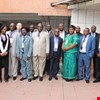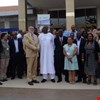


The Global Water Partnership – Mediterranean (GWP-Med) has established a long-term, mutually benefitial collaboration agreement with the General Department for Planning and Conservation of Agricultural Lands at the Tunisian Ministry of Agriculture on integrating climate change considerations in the latter’s new water and soil preservation planning, as well as on developing a territorial planning methodology using the Douimis basin as a pilot case.

From 22- 23 October 2015, the Global Water Partnership Eastern Africa (GWPEA) conducted a regional workshop themed “ Role of the media in promoting water security, climate resilience and drought risk management”. The workshop was attended by 15 media practitioners from Uganda, Kenya, Rwanda, Burundi, Sudan, Ethiopia and Djibouti.

The workshop on the mobilization of Economic Community of Central African States (ECCAS) experts for reshaping hydrological norms was held in Douala, Cameroon from October 20th to 21st, 2015.
This workshop was implemented within the framework of the project known as RESIHYST Africa Project “Hydrological standards reviewing for resilient hydraulic infrastructure to climate change in Africa “. It was organized by UNESCO in collaboration with the Economic Community of Central African States (ECCAS).
This workshop brought together ECCAS’ experts in database management, GWP-CAf expert officials from ministries of water, transport, public works and focal points of International Hydrological programme (IHP) from Burundi, Cameroon, Chad, Central African Republic, Congo, Democratic Republic of Congo, Sao Tome and Principe as well as representatives of universities and hydrological research center.

One of the critical challenges facing the water sector is climate change. Studies have shown that Uganda is highly vulnerable to climate change and variability. This means that the economy and wellbeing of its people are tightly bound to climate. This has been demonstrated by increasing climate variability and occurrences of floods and droughts over the last two decades. These changes are likely to have significant implications for water sources, agriculture, food security, and soils.

GWP Ghana, in collaboration with the Water Resources Commission, hosted the 7th WACDEP Technical Coordination Workshop. The workshop took place in Accra, Ghana, from 5th to 7th October 2015.

Within the framework of IDMP implementation, GWPEA has started the process of documenting and sharing the knowledge about good case studies on drought resilience the Horn of Africa, in selected countries including Uganda, Kenya and Ethiopia

The third and final “Climagine” consultation workshop was organised by the Global Water Partnership – Mediterranean (GWP-Med), in the framework of the regional ClimVar Project “Integration of the Climate Variability and Change Impacts in the Integrated Coastal Zones Management National Strategies”, through two consecutive consultations, one in the archipelago of Kerkennah in Southern Tunisia, on July 28th, 2015 and one in Tunis the day after, both with more than 25 participants from key organisations involved in Tunisia and Kerkennah’s coastal management.

The Global Water Partnership – Mediterranean (GWP-Med) has established a formal agreement with the Department for Planning and Conservation of Agricultural Lands at the Tunisian Ministry of Agriculture towards integrating climate change considerations in water and soil conservation planning, under the WACDEP (Water, Climate & Development) Programme; and in this context, it has entered a very fruitful collaboration with the Ministry, as well as the Regional Department for Agriculture in Bizerte, in Tunisia’s North, using the Douimis Basin in the Bizerte Region as a pilot for the development of the climate change mainstreaming methodology.

GWPEA in collaboration with CapNet and Uganda National Water and Sewage Corporation organized a five days training for Young Water Professionals on Integrated Water Resources Management (IWRM) and Climate change
As climate negotiators meet in Bonn, GWP South Asia Regional Council Member from Nepal Batu Uprety says the mandate of the Least Developed Countries (LDCs) Expert Group must be renewed at COP21 to continue to support the LDCs on climate change adaptation.